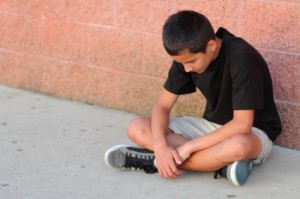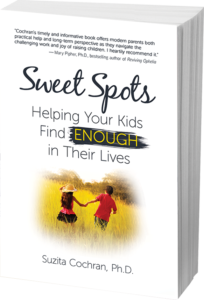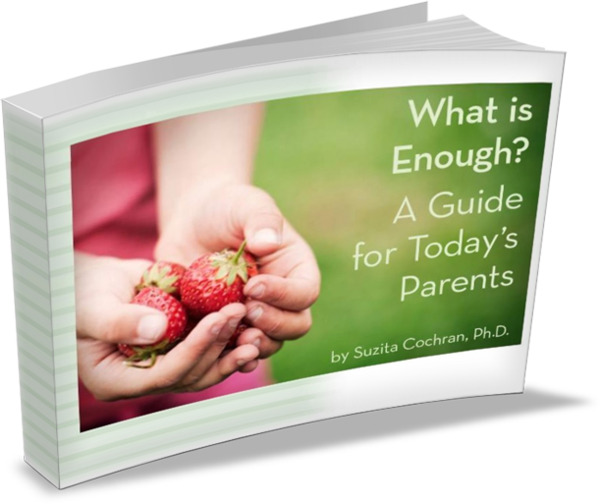 Our middle son, Daniel, just began middle school. A middle child in middle school. It’s gone about as you would expect from that combination – not too well. Daniel now attends our neighborhood middle school, but comes to it from an elementary school across town with few friends in tow.
Our middle son, Daniel, just began middle school. A middle child in middle school. It’s gone about as you would expect from that combination – not too well. Daniel now attends our neighborhood middle school, but comes to it from an elementary school across town with few friends in tow.
The challenge is that most of the 6th graders at this middle school came from neighborhood elementary schools and therefore knew each other already. School’s been in session for 6 weeks now. Daniel is slowly getting to know other kids, but no fast friendships have emerged.
Instead he’s been learning the lesson that sometimes this process takes a while. If only he weren’t such a social kid, like so many middle children. Then he wouldn’t care and it would all be a bit easier. But he does and it hasn’t been.
So I find myself musing about teaching my children to handle uncertainty. We don’t know how this will turn out for Daniel in the end. Will he make good friends, or even a best friend? Or will it end up being one of those school years when he learns to manage on his own?
But this is life, right? We’ve all been through these tough situations. Perhaps this is why it’s so hard to watch our kids face them.
However, I did feel better after reading Jonathan Fields’ book, Uncertainty: Turning Fear and Doubt into Fuel for Brilliance. To be honest I don’t know about the turning it all into brilliance part. This is middle school after all. But fear, doubt, and uncertainty – those we have.
Fields writes about developing a tolerance for ambiguity because ambiguity and uncertainty go hand in hand with any creative process. I immediately latched on to this concept! I was supporting Daniel to strengthen his tolerance for uncertainty. Because, as Fields says, without this there would be no creation and innovation, crucial life skills.
Yet, even though I now have a goal, Daniel still has to handle daily uncertainty. If only he knew that it would all turn out okay in the end. That would help him hang in there! Of course that scenario would pretty much remove the un- from uncertainty. Instead Daniel must remain in the uncomfortable position of not knowing how middle school will unfold.
Uncertainty is like wearing an itchy wool sweater that’s a size too small – and because this is about middle school we’ll say it’s also a bad color on you. The sweater’s not going to kill you, and in good moments you manage to forget about it. Yet it’s just not going to be a pleasant time when you’re wearing the thing.
How Do We Help a Child Handle Life’s Ambiguities?
I had one initial idea. As it happened our family adopted a Humane Society kitten before the school year began. Way back before we had kids I’d come up with the idea to name our next cat, Ambiguity. Then each time it plopped its fuzzy, warm body onto my lap, I’d be “sitting with Ambiguity.” I would practice accepting the many things undone and endings unknown around me, while calmly stroking a soft kitty.
Of course when I floated the name Ambiguity by my kids, it went over like a pregnant high jumper, as my mom used to say in the 70s. In the end we named her Shenandoah (daughter of the stars) for the river in my home-state of Virginia.
6 More-Vetted Ways to Help Children Learn to Sit With Ambiguity
1. Predict. Help your child by predicting some of the challenges that may lie ahead. “Expect it to take a while to get to know all the rules in your new school. I bet it will feel a little awkward for a bit.” “What will you do if you don’t have someone to walk home with?”
2. Exercise. Uncertainty is stressful. Exercise relieves tension and anxiety, in addition to helping children eat and sleep well during ambiguous times.
3. Give kids small rewards and acknowledgments for tolerating uncertainty. During this challenging transition to middle school, Todd and I have given Daniel small treats now and again – a movie or special dessert. We tell him we’re proud of him for simply hanging in there. This falls in the same camp as my stepfather paying me for failing when I was a child. It’s worth acknowledging the tough things our kids are handling.
4. Travel. In new places you and your children will quickly be reminded that things never go quite as planned on a trip. Will the boat come on time? Will we like the apartment we rented? Will the kids eat the food?
Travel reminds us that even when events don’t play out as expected, some sort of adventure takes place. The unpredictability and uncertainty of travel can teach kids (and parents) to become comfortable with these experiences. Like the time we took our kids to Costa Rica to learn some Spanish and one of their favorite experiences turned out to be the adventures we had riding local buses.
5. Get a pet. Unconditional love from an animal can be exceedingly beneficial to a child facing one of life’s struggles.
6. Share your own experiences of ambiguity. Like all children, mine adore stories Todd and I tell from our childhoods. The ones they love best are those about our past challenges and failures.
My Uncertainty Story
I told Daniel this story last week.
One day while studying abroad in Cambridge, England, I saw a notice about upcoming try-outs for the rowing team of the college I was attending. I was on my university’s rowing team at home and jumped at the idea of rowing in England. I assumed I’d show up to the try-outs with numerous hopeful rowers new to the college. Instead, on the morning of the try-outs, I stood there as the only outsider in a group of college girls who clearly all knew each other.
It soon became apparent that they’d rowed together the previous year. And it was raining. Of course. My first thought was to sneak off, jump back on my bike, and ride (on the left side of the street) back to my apartment. And honestly I was beginning to do just that when the rowing coach saw me. I had to stay and face this uncertain situation.
At that point a little saying popped into my head. I’d come up with this mantra during another awkward experience recently. “The best things in life sometimes start out the worst.” I began silently repeating it to myself.
I slipped my shoes off and slid onto the wooden seat the coach pointed me to in the 8-person boat. At least I was about to do something familiar. Soon everyone would be focused on rowing, not on the new American girl in seat 3.
As we pushed out onto the water, however, something immediately felt unusual about this rowing shell. Turns out the British have a different style of rowing than Americans. Now I was the new American girl in seat 3 who looked like she didn’t know how to row. “Brilliant!” as they say in England.
As luck would have it, on that fateful day of try-outs one girl had not returned from the year before. And I was there. After a brief explanation that I actually had rowed before, and felt I could learn the British method of rowing, the coach agreed to give me a try.
It took a while to get to know my rowing-mates – the British aren’t known for their extroversion. However, I slowly became more at ease with the 7 other college girls in my boat. Our coxswain, Simon, was quite welcoming from the start.
As I look back now on my time abroad, some of my fondest memories are of traveling to various sites in England for rowing regattas. And I’ll never forget the extremely formal end-of-season rowing banquet. A five-course meal topped off with a serving of port in a beautiful banquet hall. It was a scene right out of Chariots of Fire.
What I Told Daniel Next
Wherever we end up sitting with ambiguity – on a rather hard middle school desk chair, or in an 8-person British shell rowing the wrong way – it’s rarely comfortable. But if we can learn to tolerate the discomfort of uncertainty, we may end up finding some of life’s true gems just down the path.
Additional ways to help kids handle uncertainty? Other thoughts? Leave a comment below!

 Sweet Spots: Helping Your Kids Find ENOUGH in Their Lives.
Sweet Spots: Helping Your Kids Find ENOUGH in Their Lives.


And of course we adults have MANY opportunities to do this as well – changing some of those not so great habits – to set examples for our kids. Trying a new class in art or yoga that we’ve always wanted to do, for example. Being open to change requires some comfort with uncertainty and trust in the outcome/future, two things very hard to learn! Thanks for the ideas!!
I often forget that kids are constantly having to learn new things. It’s all part of being a kid and going to school. At least we adults usually get to choose when we are going to learn something new (by taking a new class, for example). I must say this is one of the things I appreciate most about being an adult.
Along these lines, when I first began taking pilates, I had to bring one of my sons to a class because he was home sick from school. After the class my son said to me, “Mama, you sure did get in trouble a lot in class today!” (I’m not a natural at pilates and the teacher kept commenting that I was doing something wrong.)
Thanks for your comment!
🙂 Lovely story.
We’ve just moved for the 2nd time in Amy’s short time already (she’s 3 1/2) and we’ll be moving again sometime in the next year. For us, the second time went better for her than the first because we didn’t pretend nothing was happening. I guess it was the “predict” above. The other thing we found was to acknowledge things were happening to us as well. “You’ll be at a new nursery, and daddy will be at a new work. How do you think he should make friends?” All of which seemed to prime her to be ready as well.
(Much more lay back in the US style, I seem to recall? 🙂 )
(The previous comment was from a true Cambridge Univ. rower, by the way.)
I’m so glad Amy did better during the second move. I hope your next one goes even more smoothly.
Yes, US rowing is both more hunched over and laid back. British is more straight-backed (probably better for the posture, actually).
It was those struggles in Junior High and High School that set me up to be successful in my professional life.
I grew up in a small town, with a K-12 school. My class was know by all of the teachers from early elementary as having just a nasty group of girls. I never fit in with their click, and really didn’t want to. Because of this I spent a lot of time alone. I spent a lot of time dreaming about who and what I wanted to be.
When my high school counselor would call me down to his office to ask what my plans were for after high school my answer was always the same – “I’m going to be one of the best at what I do, and I’m going to travel!” He would tell me to get a realistic goal and send me back to class. By the time I was 21 I was working for a company that did software for Hotels and Resorts. And I spent a great deal of time in the Caribbean. My job had me relocate to Hong Kong for close to a year. By the time my 10 year reunion came around, I had become one of the best at what I did, and I was traveling. Everyone else at my reunion really hadn’t accomplished anything. Again I felt out of place, and that was okay with me. It was those years that made me feel out of place, and taught me how to create the life that I’m living and I wouldn’t change a change a thing!
I’m very thankful for the blessing that those years of ambiguity brought me.
An impressive share! I’ve just forwarded this onto a co-worker who had been conducting a little homework on this.
And he in fact bought me breakfast because I stumbled upon it for him…
lol. So allow me to reword this…. Thank YOU for the meal!!
But yeah, thanks for spending time to discuss this topic here on your blog.
What a nice message! Thanks. I showed this to my son (the one about which this post was written) and it made him smile.
Lovely article. My son has ADHD and he has trouble making friends back then. The symptoms take a toll on him in many ways blocking him from forming friendships. He is fine now though. We brought him to a specialist and they prescribed him with meds. I’m not saying you should trust it all on meds, he handles his ADHD well now because of me and my family’s support and love. Thank you for this very good read. Cheers and love to all parents out there.